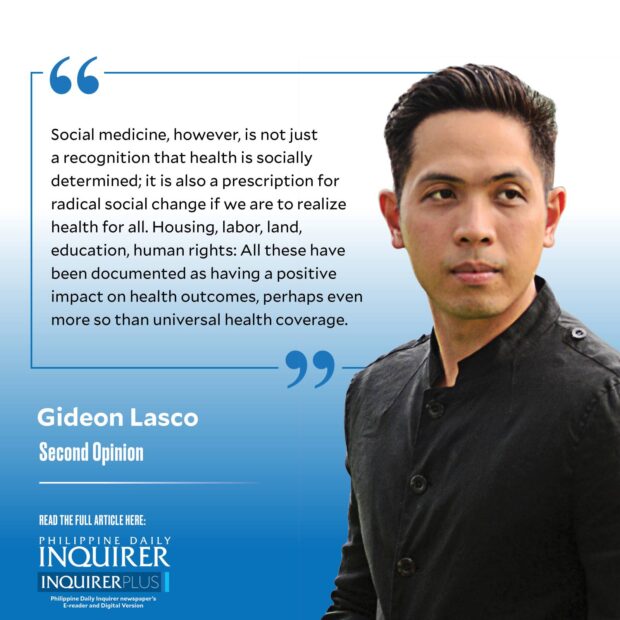Rx: Social medicine
Social medicine, in the words of the late Paul Farmer, is the recognition that “social forces—poverty, racism, gender inequity, incarceration, political neglect, economic inequality, and other such relations of power—have a part in determining who falls ill, who lives to get better, and who dies.” In recent weeks, I have been privileged to revisit social medicine with David Shumway Jones, Mercedes Becerra, Salmaan Keshavjee, and Lindsey Marten Zeve, all of whom had worked with Farmer at Harvard.
On one level, this recognition is one that any casual observer of society can make: The rich have better access to medicines, hospitals, nutrition, and overall quality of life.
Article continues after this advertisementBut social medicine goes deeper, extending the analysis to the root causes of these inequalities, employing both public health (e.g., epidemiology) and the social sciences (e.g., anthropology and history) in the process. For instance, Friedrich Engels in “The Condition of the Working Class in England” (1845), implicated the Industrial Revolution and its profound societal, economic, and political transformations as leading to illness, injury, starvation, and “social murder” among the workers in Manchester, offering both quantitative (e.g., mortality rates) and qualitative data (i.e., detailed descriptions) to support his claims.
A few years later, Rudolf Virchow, a physician, described how the typhus epidemic among the people in Upper Silesia (now part of Poland), as well as illnesses in general were also caused by their social and political circumstances. He called for higher wages, better employment, public education, among other sweeping reforms, later writing that “medicine is a social science and politics is nothing but medicine on a grand scale.”
Engels and Virchow diverged in their political goals but they saw human flourishing as a precondition to human health. In other words, people can only be free from illness when they are free from political, social, and economic oppression. Virchow went on to advocate for public health reforms in Prussia, living long enough to meet Jose Rizal, whom he later eulogized as a “highly gifted, noble martyr.”
Article continues after this advertisementThe rise and dominance of the Pasteurian paradigm—i.e., that disease is caused by germs—somewhat eclipsed this way of thinking throughout much of the world by giving rise to the reductionist hope that drugs can cure all diseases (In this sense, all drugs are wonder drugs, in that they promise to cure disease even as they individualize it). Nonetheless, social medicine continued to be championed by the likes of Salvador Allende, a medical student and pathologist who would become president of Chile after devoting his career in improving the living standards in his country. It gained even more resonance after World War II when it became clear that antibiotics and vaccines were not solving the world’s health problems.
Social medicine, however, is not just a recognition that health is socially determined; it is also a prescription for radical social change if we are to realize health for all. Housing, labor, land, education, human rights: All these have been documented as having a positive impact on health outcomes, perhaps even more so than universal health coverage. Indeed, public health goals like the eradication of tuberculosis (TB) and the elimination of stunting have less to do with actual health programs than overall improvement in standards of living enabled by structural reforms.
All of this should make us even more angry at politicians who steal our people’s wealth and squander “intelligence funds” that should have gone to basic but neglected public goods. All of this should make us even more determined to replace them with leaders who care for people’s health, and do so as an end in itself.
Social medicine requires doctors to think like social scientists, but also for social scientists and other sectors—including patients themselves—to practice social medicine, that is, to shape health care and also be involved in a much broader project to improve people’s quality of life. Medicine is too important to be left to doctors alone, and we need to empower the poor to be their own “natural attorneys.” In the University of the Philippines College of Medicine—where community and social medicine practitioners have long influenced students like myself to think critically about health—efforts are now underway to create a “Department of Social Medicine” and I hope the college and university leadership supports this initiative.
Indeed, our prescriptions will fall short if we fail to study and address the conditions that enable and produce illness, or what Farmer calls “structural violence.” There are promising developments in TB research—from a potential vaccine to shorter regimens—that give me some hope, and I’m glad to hear from Health Secretary Teodoro Herbosa that TB is one of the Department of Health’s priorities. However, we should heed the Filipino physician C. Peñaflor, who, amid the early 1950s triumphalism over the then-novel bacille Calmette-Guerin vaccine, presciently wrote:
“All students would agree, of course, that the factors which contribute to our high morbidity and mortality rates can be adequately summarized in one word: poverty.”
—————-
glasco@inquirer.com.ph

















